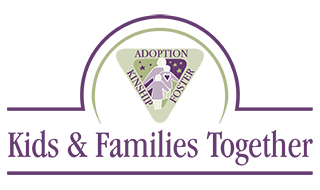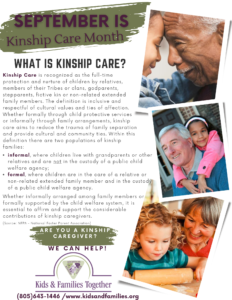
National Kinship Awareness Month
Background
The care of children by kin has centuries of tradition, long before the formal child welfare system was created, including family foster care. Tired parents could get a rest when grandparents would take youngsters and teens for a few hours or days. Relatives stepped in when there were parental financial, medical, or other crises and tragedies. Children would live with grandparents, aunts and uncles, older siblings, or extended family members when parents needed to find employment and couldn’t take the children with them, including when parents were deployed to serve the country.
It was only in the early 1990s that relatives raising their younger family members were identified as a specific child welfare program area. “Family preservation” was coined in the 1970s, and of course foster care and adoption programs date back a previous century. But there was no nationally recognized, consistent name for the policies, programs, and practices connected with relatives raising children. To address growing concerns about the need for improved outcomes for children in foster care, in 1990 the Child Welfare League of America and the National Foster Parent Association collaborated to convene a National Commission on Family Foster Care.
With the considerable increase in the number of relatives caring for their younger family members and their commensurate compelling challenges, the Commission looked for a name that would differentiate foster parenting and care by relatives. Variously described as relative care, extended family care, home of relative care, and foster care with relatives, the National Commission wanted a name that respected and reflected the significance of family relationships. The strength of kinship systems among diverse cultural and ethnic groups had long been documented, for example in the 1974 book by Dr. Carol Stack, All Our Kin – Strategies for Survival in a Black Community. Thus, the name “kinship care” was selected by the National Commission under the leadership of NFPA and CWLA. It was published as a special chapter, “The Significance of Kinship Care,” in A National Blueprint for Fostering Infants, Children, and Youths in the 1990s. (nfpaonline.org)
Kinship Care Today
Kinship care is recognized as the full-time protection and nurture of children by relatives, members of their Tribes or clans, godparents, stepparents, fictive kin, or non-related extended family members. The definition is inclusive and respectful of cultural values and ties of affection. Whether formally through child protective services or informally through family arrangements, kinship care aims to reduce the trauma of family separation and provide cultural and community ties. Within this definition there are two populations of kinship families:
- Informal, where children live with grandparents or other relatives and are not in the custody of a public child welfare agency;
- Formal, where children are in the care of a relative or non-related extended family member and in the custody of a public child welfare agency.
Whether informally arranged among family members or formally supported by the child welfare system, it is essential to affirm and support the considerable contributions of kinship caregivers.
Kinship Care in the United States
- 8 million- number of children who live with a relative who is the head of the household
- 2.6 million- number of children who are being raised by a relative or close family friend and do not have a parent living in the household
- 137,356-number of children in foster care being raised by relatives
- For every 1- child raised by kinship in foster care, there are 18 being raised by kin outside of foster care
- In 2010 26%- of children in foster care are being raised by relatives
- In 2020 34%- of children in foster care are being raised by relatives (gu.org)
Local support
In Ventura County, it is estimated that over 5,000 grandparents are raising grandchildren. Kids & Families Together has provided therapeutic counseling and education support services to kinship caregivers for over 20 years. Part of our work is provided by our Peer Partner and Educator program (PPE.) PPEs are para-professionals with lived experience in being a resource parent and or informal kinship caregiver. These amazing individuals walk alongside new or existing kinship caregivers coaching them on the Child Welfare System and Community Resources.
In 2022-2023 PPEs provided education-support services to:
- 508-Resource Parents: relative and community homes
- 1157 hours- of education-support services to relative and community homes. This includes coaching families on understanding the Child Welfare System and Community Resources
In 2022-2023 PPEs provided education-support services to:
- 453– Informal Kinship Caregivers (outside of foster care)
- 1490 hours- of education-support services to informal kinship caregivers. This includes training and coaching (Informal Kinship Caregivers) on the Child Welfare System and resources and referrals for personal and household items
Advocacy
While much progress has been made to support kinship families – such as Navigator Programs – much more is needed. For example, while there is a National Foster Care Month, we need to advocate for a National Kinship Care Month. Some states have been able to successfully achieve state resolutions for Kinship Care Month, but a National Kinship Care Month is essential to be both celebratory and achieve essential resources for every kinship caregiving family across America. And words matter: there is a need for quality kinship care and quality family foster care. Kinship caregivers and foster parents are better together and advocate together for resources for all children!
Resources/Links/More Information
 Kids and Families Together
Kids and Families Together